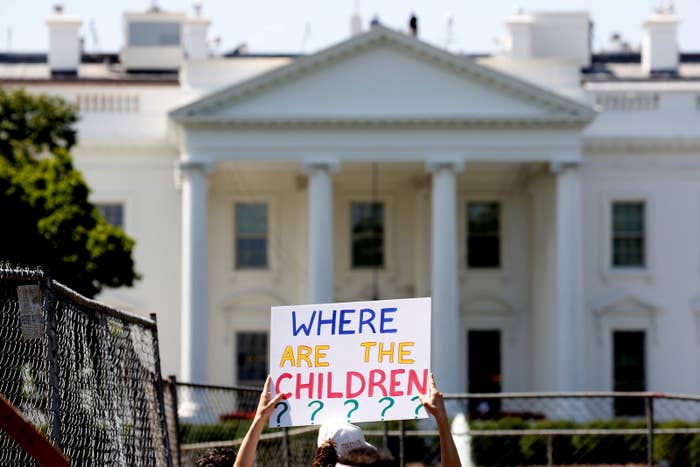
The Trump administration expects to partially meet a court-ordered deadline this week to reunify children under 5 years old who were separated from a parent at the border, a Justice Department lawyer said Monday.
Of the 96 children under 5 identified by the government in US District Judge Dana Sabraw's reunification order from last month, the government expects to reunify 54 children — and possibly at least five more, depending on the results of their parents' criminal background checks — with a parent by the judge's Tuesday deadline, DOJ lawyer Sarah Fabian told Sabraw.
Once those children are reunited with their parents, who are still in ICE custody, the children and the parents will likely be released since the parents are not being held in family detention centers, Fabian said.
Two children were each reunited with one parent who was already released from custody, Fabian said.
Sabraw ordered the government to reunify children under five who were separated at the border with a parent by July 10. All other eligible, separated children must be reunited with parents by July 26, under the judge's order. The government has not yet provided Sabraw with an update on those reunification efforts.
Per the latest breakdown from the Justice Department on Monday, as many as 40 children may not be reunited with their parents by Tuesday. Sabraw ordered the government and the American Civil Liberties Union, which represents the plaintiffs in the case, to file papers Tuesday morning identifying which children the government did not expect to reunify in time, the reason the government needs more time, and a proposed schedule for making it happen.
The government has struggled to meet Sabraw's first reunification deadline, saying that it's had trouble locating parents who were already deported or released from immigration custody into the United States. The government's court filings and statements in court have underscored the lack of communication between federal agencies responsible for managing adults and children in immigration detention and the apparent lack of planning to reunify separated families.
Sabraw said he was open to extending the Tuesday deadline for some children if the Justice Department provided specific explanations. Fabian said the parents of 18 children on the list were no longer in immigration detention — half were deported and half were released in the United States — and that the government was still trying to find and contact them. She said the government was providing information to the ACLU about the parents' release dates and the countries they were sent to in order to help track them down.
The government's list originally included 102 children under five, but Fabian said six were removed because the parent had a criminal record that made them ineligible for reunification, or the government found that the adult who crossed the border with the child was not actually their parent.
Fabian said 12 of the children on the list had parents in state or federal criminal custody, which would delay reunification. For the eight parents in federal custody, most, if not all, also have immigration detainers, which means they'll be transferred to immigration custody once their criminal cases are over and then can be reunited with their children, Fabian said. For the four parents in state custody, the federal government may not know when they're released, Fabian said, but the ACLU would receive their information to try to coordinate.
Four children on the list were set to be released to a nonparent sponsor, and Fabian said the government is in the process of contacting parents to see if that was still what they wanted.
And for the remaining child on the list, Fabian said the government did not know the status of their parent.
Sabraw asked ACLU lawyer Lee Gelernt on Monday if Gelernt believed that the government was in compliance with Sabraw's reunification order to the best of its ability. Gelernt said he thought the government was making an effort to comply, but it wasn't clear how much effort it would put into finding released parents. The ACLU has also disagreed with the government's process for verifying child–parent relationships when a parent had been released from immigration detention, saying the process is unnecessarily slow.
"The court is holding the Trump administration’s feet to the fire to get these kids reunited with their parents. That’s the most important thing. It’s extremely disappointing the government will not be in full compliance with the court order, but the judge has stepped in to manage this mess of the administration’s making," Gelernt said in a statement to reporters after the hearing.

